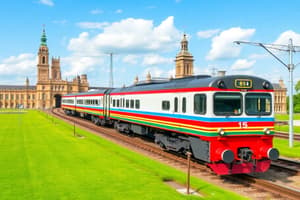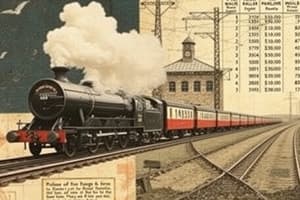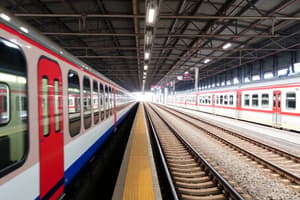Podcast
Questions and Answers
What distinguishes capital transactions from revenue transactions in railway accounting?
What distinguishes capital transactions from revenue transactions in railway accounting?
- Revenue transactions involve the acquisition of concrete assets.
- Capital transactions involve the acquisition of concrete assets. (correct)
- Revenue transactions are solely for passenger amenities.
- Capital transactions relate to working expenses.
What is the purpose of maintaining separate accounts for capital and revenue transactions?
What is the purpose of maintaining separate accounts for capital and revenue transactions?
- To track employee expenses more efficiently.
- To minimize expenditure on concrete assets.
- To adequately gauge the financial results of railway operations. (correct)
- To simplify the overall accounting process.
Which fund is primarily associated with the expenditure incurred on acquiring amenities for passengers?
Which fund is primarily associated with the expenditure incurred on acquiring amenities for passengers?
- Accident Compensation Fund
- Revenue Fund
- Safety Fund
- Development Fund (correct)
What is the role of the Depreciation Reserve Fund in railway accounting?
What is the role of the Depreciation Reserve Fund in railway accounting?
What is a block account used for in railway financial accounting?
What is a block account used for in railway financial accounting?
Which of the following is NOT considered a head under which capital nature expenditure is classified?
Which of the following is NOT considered a head under which capital nature expenditure is classified?
What type of financial transactions does revenue refer to in railway accounting?
What type of financial transactions does revenue refer to in railway accounting?
What is the primary function of the Miscellaneous Advances head of account?
What is the primary function of the Miscellaneous Advances head of account?
Which of the following is NOT covered by the Miscellaneous Advances head?
Which of the following is NOT covered by the Miscellaneous Advances head?
What does the balance of the 'Other Railway' suspense account indicate?
What does the balance of the 'Other Railway' suspense account indicate?
Under which major head are the deposits for unpaid wages accounted?
Under which major head are the deposits for unpaid wages accounted?
How are unpaid wages treated in the accounting system?
How are unpaid wages treated in the accounting system?
How should engineering expenses be apportioned?
How should engineering expenses be apportioned?
Locomotive expenses are apportioned based on which criteria?
Locomotive expenses are apportioned based on which criteria?
What basis is used to divide traffic expenses?
What basis is used to divide traffic expenses?
Which mechanism is used for distributing store balances in the railway?
Which mechanism is used for distributing store balances in the railway?
How should recoveries from over-payment made in previous years be recorded?
How should recoveries from over-payment made in previous years be recorded?
What proportion is used to apportion expenses of other departments?
What proportion is used to apportion expenses of other departments?
Which expenses may be apportioned on the basis of engine kilometres and vehicle kilometres?
Which expenses may be apportioned on the basis of engine kilometres and vehicle kilometres?
What should be done when recoveries are made due to over-payment on attendance?
What should be done when recoveries are made due to over-payment on attendance?
What is the criterion for dividing carriage and wagon expenses?
What is the criterion for dividing carriage and wagon expenses?
What should be accounted for under the same detailed head of account by the involved railways?
What should be accounted for under the same detailed head of account by the involved railways?
Who is primarily responsible for the allocation of all receipts and payments?
Who is primarily responsible for the allocation of all receipts and payments?
Which of the following is NOT a purpose of detailed classification in administrative accounts?
Which of the following is NOT a purpose of detailed classification in administrative accounts?
What is a condition precedent to effective financial control?
What is a condition precedent to effective financial control?
When should changes in accounting classification be introduced according to the guidelines?
When should changes in accounting classification be introduced according to the guidelines?
What should each bill or voucher received from departmental officers indicate?
What should each bill or voucher received from departmental officers indicate?
What is the primary object of accounting classification in railways?
What is the primary object of accounting classification in railways?
How should expenditure be recorded if the accounting classification changes during the year?
How should expenditure be recorded if the accounting classification changes during the year?
What is necessary for adjustments between railways as per the guidelines?
What is necessary for adjustments between railways as per the guidelines?
Which document is responsible for ensuring that allocation shown on an initial document is not prima facie incorrect?
Which document is responsible for ensuring that allocation shown on an initial document is not prima facie incorrect?
What happens to the liability when payment is made in the following calendar month?
What happens to the liability when payment is made in the following calendar month?
Which accounts are affected when a salary bill for April is passed for payment in May?
Which accounts are affected when a salary bill for April is passed for payment in May?
Why is the cash book closed at the end of the month?
Why is the cash book closed at the end of the month?
What entry is made in the Cash Book for May regarding Demands Payable for April?
What entry is made in the Cash Book for May regarding Demands Payable for April?
How should overestimated charges be handled in the accounts?
How should overestimated charges be handled in the accounts?
What is necessary for all working expenses to be charged to the proper Revenue Accounts?
What is necessary for all working expenses to be charged to the proper Revenue Accounts?
What should be done if an estimate was too low?
What should be done if an estimate was too low?
What accounts are credited when the cash book entry is made in May for expenses?
What accounts are credited when the cash book entry is made in May for expenses?
What must be considered when debiting a proper head of expenditure?
What must be considered when debiting a proper head of expenditure?
When is the journal entry for salary bill made?
When is the journal entry for salary bill made?
What does the balance under the minor head 'Railways' under the major head 871 represent?
What does the balance under the minor head 'Railways' under the major head 871 represent?
Which account is used for closing all heads of accounts that do not record Railway revenue or expenditure?
Which account is used for closing all heads of accounts that do not record Railway revenue or expenditure?
Where are receipts credited for the Depreciation Reserve Fund related to Railways?
Where are receipts credited for the Depreciation Reserve Fund related to Railways?
What is a significant function of the major head No. 880 under L-Suspense and miscellaneous?
What is a significant function of the major head No. 880 under L-Suspense and miscellaneous?
Which option delineates a transaction closed to the head 'Transfer Railways'?
Which option delineates a transaction closed to the head 'Transfer Railways'?
What is accounted for separately when expenditure is incurred on acquiring amenities for railway users?
What is accounted for separately when expenditure is incurred on acquiring amenities for railway users?
Which of these statements best describes capital transactions in railway accounting?
Which of these statements best describes capital transactions in railway accounting?
Which part of the government accounts deals primarily with the proceeds of taxation?
Which part of the government accounts deals primarily with the proceeds of taxation?
Which fund covers the expenditure related to safety works in railway accounts?
Which fund covers the expenditure related to safety works in railway accounts?
What is primarily recorded in the Contingency Fund of India?
What is primarily recorded in the Contingency Fund of India?
What does the block Account in railway accounting represent?
What does the block Account in railway accounting represent?
In government accounts, which division does NOT belong to the Public Account of India?
In government accounts, which division does NOT belong to the Public Account of India?
Which of the following is NOT a head under which capital nature expenditure is classified?
Which of the following is NOT a head under which capital nature expenditure is classified?
From which fund is the expenditure on renewals of railway assets primarily financed?
From which fund is the expenditure on renewals of railway assets primarily financed?
Which of the following is NOT classified in the Consolidated Fund of India?
Which of the following is NOT classified in the Consolidated Fund of India?
Under which division are railway funds like the Depreciation Reserve Fund classified?
Under which division are railway funds like the Depreciation Reserve Fund classified?
What is the main purpose of separating capital and revenue transactions in railway accounting?
What is the main purpose of separating capital and revenue transactions in railway accounting?
Which entry pertains to recorded transactions other than debt under the Public Account of India?
Which entry pertains to recorded transactions other than debt under the Public Account of India?
What characterizes the expenditure recorded in the Capital division of the Consolidated Fund?
What characterizes the expenditure recorded in the Capital division of the Consolidated Fund?
Which main head is NOT part of the Consolidated Fund of India?
Which main head is NOT part of the Consolidated Fund of India?
What must repaid moneys recorded in the Public Account of India ultimately derive from?
What must repaid moneys recorded in the Public Account of India ultimately derive from?
What does the balance at the end of the month in the suspense head 'Demands Payable' represent?
What does the balance at the end of the month in the suspense head 'Demands Payable' represent?
Which statement about the 'Demands Payable' suspense head is correct?
Which statement about the 'Demands Payable' suspense head is correct?
When should the necessary budget provision for a change take effect?
When should the necessary budget provision for a change take effect?
What is required for journal entries reflecting debits to working expenses in 'Demands Payable'?
What is required for journal entries reflecting debits to working expenses in 'Demands Payable'?
How should separate accounts be maintained for 'Demands Payable'?
How should separate accounts be maintained for 'Demands Payable'?
What is the primary difference between railway accounts and government accounts regarding expenditure?
What is the primary difference between railway accounts and government accounts regarding expenditure?
How are engineering expenses primarily apportioned?
How are engineering expenses primarily apportioned?
When are accounts of a month generally kept open to accommodate journal entries?
When are accounts of a month generally kept open to accommodate journal entries?
What is a significant aspect of the railway's 'Demands Payable' treatment in financial accounting?
What is a significant aspect of the railway's 'Demands Payable' treatment in financial accounting?
Which basis is used to allocate locomotive expenses?
Which basis is used to allocate locomotive expenses?
What must be done before changes are implemented in accounting classification according to guidelines?
What must be done before changes are implemented in accounting classification according to guidelines?
What is the basis for distributing the Stores balances of the Railway?
What is the basis for distributing the Stores balances of the Railway?
How are Electrical and Signal workshops' expenses apportioned?
How are Electrical and Signal workshops' expenses apportioned?
What should be done with recoveries from over-payment of previous years?
What should be done with recoveries from over-payment of previous years?
How is the recovery due to over-payment on attendance treated?
How is the recovery due to over-payment on attendance treated?
What is the classification mechanism for Electrical, Signal and Tele-communication expenses?
What is the classification mechanism for Electrical, Signal and Tele-communication expenses?
What accounts should be credited when the cash book entry is made for expenses in May?
What accounts should be credited when the cash book entry is made for expenses in May?
What should be reflected in the schedule of expenditure accompanying the monthly capital accounts?
What should be reflected in the schedule of expenditure accompanying the monthly capital accounts?
Flashcards
Capital and Revenue Accounts
Capital and Revenue Accounts
Financial reports that separate a railway's investment in assets from its day-to-day operations, providing a clear picture of its financial health.
Capital Transactions
Capital Transactions
Transactions related to acquiring permanent assets like buildings, equipment, and land. These investments form the foundation of a railway's operations.
Revenue Transactions
Revenue Transactions
Transactions associated with the daily operations of the railway, including earning revenue from passenger tickets and freight, and expenses like salaries and fuel.
Development Fund
Development Fund
Signup and view all the flashcards
Depreciation Reserve Fund
Depreciation Reserve Fund
Signup and view all the flashcards
Accident Compensation, Safety and Passenger Amenities Fund
Accident Compensation, Safety and Passenger Amenities Fund
Signup and view all the flashcards
Block Account
Block Account
Signup and view all the flashcards
Locomotive Expenses Apportionment
Locomotive Expenses Apportionment
Signup and view all the flashcards
Traffic Expenses Apportionment
Traffic Expenses Apportionment
Signup and view all the flashcards
Carriage and Wagon Expenses Apportionment
Carriage and Wagon Expenses Apportionment
Signup and view all the flashcards
Gross Tonne Kilometrage
Gross Tonne Kilometrage
Signup and view all the flashcards
Stores Balances Distribution
Stores Balances Distribution
Signup and view all the flashcards
Recoveries of Overpayments
Recoveries of Overpayments
Signup and view all the flashcards
Attendance Overpayment Recoveries
Attendance Overpayment Recoveries
Signup and view all the flashcards
Credits for Completed Projects
Credits for Completed Projects
Signup and view all the flashcards
Exhibition of Recoveries
Exhibition of Recoveries
Signup and view all the flashcards
Inter-Railway Adjustments
Inter-Railway Adjustments
Signup and view all the flashcards
Inter-Departmental Adjustments
Inter-Departmental Adjustments
Signup and view all the flashcards
Purpose of Detailed Classification
Purpose of Detailed Classification
Signup and view all the flashcards
Benefits of Detailed Classification
Benefits of Detailed Classification
Signup and view all the flashcards
Allocation of Receipts and Expenditure
Allocation of Receipts and Expenditure
Signup and view all the flashcards
Accounts Department Role
Accounts Department Role
Signup and view all the flashcards
Accurate Expenditure Recording
Accurate Expenditure Recording
Signup and view all the flashcards
Stability in Accounting Classification
Stability in Accounting Classification
Signup and view all the flashcards
Allocation Changes for Works
Allocation Changes for Works
Signup and view all the flashcards
Alignment of Budget & Accounts
Alignment of Budget & Accounts
Signup and view all the flashcards
Accrual Accounting
Accrual Accounting
Signup and view all the flashcards
Demands Payable
Demands Payable
Signup and view all the flashcards
Closing the Accounts
Closing the Accounts
Signup and view all the flashcards
Cash Book
Cash Book
Signup and view all the flashcards
Journal Entry
Journal Entry
Signup and view all the flashcards
Ledger
Ledger
Signup and view all the flashcards
Provisioning
Provisioning
Signup and view all the flashcards
Miscellaneous Advances
Miscellaneous Advances
Signup and view all the flashcards
Depreciation
Depreciation
Signup and view all the flashcards
Amortization
Amortization
Signup and view all the flashcards
Other Railway
Other Railway
Signup and view all the flashcards
Deposits
Deposits
Signup and view all the flashcards
Unpaid Wages
Unpaid Wages
Signup and view all the flashcards
Railway Fund
Railway Fund
Signup and view all the flashcards
Traffic Earnings
Traffic Earnings
Signup and view all the flashcards
Contingency Fund of India
Contingency Fund of India
Signup and view all the flashcards
Public Account of India
Public Account of India
Signup and view all the flashcards
Classification in Government Accounts
Classification in Government Accounts
Signup and view all the flashcards
Expense Apportionment
Expense Apportionment
Signup and view all the flashcards
Engineering Expense Allocation
Engineering Expense Allocation
Signup and view all the flashcards
Locomotive Expense Allocation
Locomotive Expense Allocation
Signup and view all the flashcards
Carriage and Wagon Expense Allocation
Carriage and Wagon Expense Allocation
Signup and view all the flashcards
Traffic Expense Allocation
Traffic Expense Allocation
Signup and view all the flashcards
Electrical, Signal, and Telecommunication Expense Allocation
Electrical, Signal, and Telecommunication Expense Allocation
Signup and view all the flashcards
Other Department Expense Allocation
Other Department Expense Allocation
Signup and view all the flashcards
Overpayment Recoveries as Earnings
Overpayment Recoveries as Earnings
Signup and view all the flashcards
Attendance Overpayment Adjustment
Attendance Overpayment Adjustment
Signup and view all the flashcards
Railways (under Departmental Balances)
Railways (under Departmental Balances)
Signup and view all the flashcards
Railways (under Permanent Cash Imprest)
Railways (under Permanent Cash Imprest)
Signup and view all the flashcards
Capital Outlay
Capital Outlay
Signup and view all the flashcards
Net Revenue
Net Revenue
Signup and view all the flashcards
Ledger Balance Adjustment Account
Ledger Balance Adjustment Account
Signup and view all the flashcards
Commercial Basis of Railway Accounts
Commercial Basis of Railway Accounts
Signup and view all the flashcards
Debit to Demands Payable
Debit to Demands Payable
Signup and view all the flashcards
Account Heads Linking Commercial & Government Accounts
Account Heads Linking Commercial & Government Accounts
Signup and view all the flashcards
Study Notes
Railway Accounts Structure
- Railway accounts are structured to reflect both commercial and government aspects
- Commercial accounts detail capital utilization, debt/credit, profitability, and solvency
- Government accounts focus on classifying receipts and expenditures according to specific headings
- Railway accounts maintain a link between commercial and government operations
- Separate capital and revenue accounts are compiled yearly
- Capital transactions refer to acquiring assets, while revenue transactions cover operating activities
- Expenses for amenities, safety, and projects are recorded separately from other accounts
- Depreciation Reserve Fund supports asset replacements
- Capital expenditures are grouped into five key categories: Capital, Depreciation Reserve Fund, Development Fund, Accident Compensation, and Safety & Passenger Amenities Fund.
- Specific classification rules are outlined in the Indian Railway Financial Code
- Government accounts are maintained as Finance Accounts, compiled annually
- These accounts track all significant transactions
- The Consolidated Fund of India is used for government revenue
- The Public Account of India handles other public monies
- Article 267 of the Constitution permits a Contingency Fund for unforeseen circumstances
- Government accounts are divided into three primary parts: Consolidated Fund, Contingency Fund, and Public Account
- Consolidated Fund of India includes revenue, capital, and debt/loans/advances
- Government classification of transactions includes, revenue, capital, and debt categories
- Extra Railway Transactions include various off-track transactions
- The Finance Accounts track transactions classified according to government accounting practices
Division by Heads of Accounts
- Transactions are categorized into sections, divided into major, sub-major, minor, and detailed heads
- Railway revenue, capital, debt, deposits, and remittances are major accounting categories
- Appendix IV provides a detailed outline of these categories
- Commercial and Strategic transactions are categorized by the railway line
- Specific railway lines are identified to facilitate strategic classifications
Expenditure Allocation
- Engineering, locomotive, carriage, wagon, traffic, electrical, signal, and telecom expenses are allocated based on various factors (mileage, etc)
- Other departmental expenses are allocated based on factors like gross tonnage.
- Recoveries of expenditure are subject to detailed government accounting rules
- Overpayments made in prior years, excluding work-in-progress, are treated as earnings
- Expenditure for specific purposes (e.g., amenities, safety works, and unremunerative projects) are classified independently
- Separate accounting ensures accountability and accuracy
Other Railway Accounts
- Other Railway transactions are tracked in a separate account
- Separate accounts are also maintained to reflect transactions related to deposits and other similar items
- This includes unclaimed provident funds, fines, and other miscellaneous items
Miscellaneous Transactions
- The Miscellaneous Advances account tracks transactions where allocation is uncertain or immediate adjustment is not possible
- There's provision for inter-departmental transfers
- Payments made in advance are also tracked, and are not treated as immediate expenses
- This head encompasses diverse transactions like unclaimed provident funds, fines, and other miscellaneous items
Reserve Funds
- Funds exist for depreciation, railway revenue, development, pension, accident compensation, and safety & passenger amenities
- These funds are used for specified purposes (e.g., asset replacement, dividend equalization, accident compensation)
- These accounts track the funding flow and application of these funds
- Specific criteria exist for recording and utilizing funds
Accident Compensation Fund
- The fund tracks compensation to passengers involved in accidents, safety projects, and other related expenses
- This fund is used to pay for expenses related to accident compensation and passenger safety
Studying That Suits You
Use AI to generate personalized quizzes and flashcards to suit your learning preferences.
Related Documents
Description
Explore the intricate structure of railway accounts that encompass both commercial and government aspects. This quiz delves into capital utilization, classifications of receipts and expenditures, and the regulations laid out in the Indian Railway Financial Code. Understand how these accounts maintain a balance between financial and operational needs within the railway sector.




